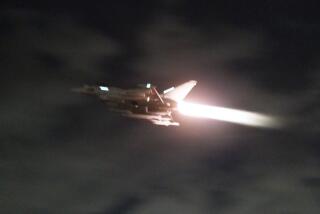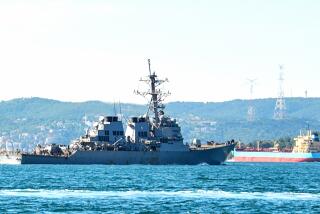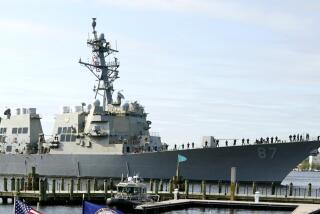Navy’s Vital Home Port in Persian Gulf : U.S.-Bahraini Ties: A Delicate Balance
- Share via
MANAMA, Bahrain — To judge from Bahrain’s government-influenced newspapers and state-controlled television, Israeli-Palestinian confrontations in the West Bank and Gaza Strip are far more threatening than the Iran-Iraq War, which is raging only a few miles away.
The press outrage at what is described as Israeli repression often spills over into denunciations of Israel’s most important ally, the United States. But at the top levels of the Bahraini government, the West Bank and Gaza disturbances seem not to have affected a long-standing pro-American orientation.
“Our relationship with the United States is based on mutual benefits,” Bahrain’s information minister, Tarik Moayyid, said Monday. “I don’t think that we should look at our relationship with the United States based on the relationship with other countries. Our relationship in this area is beneficial to both of us. It is unlikely that we would let any outside factors change this situation.”
U.S. Navy Home Port
The importance of Bahrain to U.S. strategy in the Persian Gulf is far greater than the island’s size would seem to warrant. It is about four times as large as Washington, D.C., with a population of 435,000. Bahrain is home port to the U.S. Navy’s Middle East force, the heart of the Reagan Administration’s only Middle East success story, the operation to protect U.S.-registered commercial shipping from attack by Iran or Iraq.
If anything should upset the Washington-Manama relationship, it is difficult to see how the United States could continue to operate on its present scale in the region. The euphemistically named Administrative Support Unit in Bahrain is the only U.S. military facility anywhere in the gulf.
A Western diplomatic source said the West Bank and Gaza situation is certain to increase Arab suspicions of U.S. objectives in the region. But he said that in Bahrain, the reaction seems to be more rhetorical than real, limited mostly to the Arabic-language press.
‘Very Little Action’
“When it comes to Palestine, Bahrain wants to be seen to be saying the right things, but there is very little action,” the source, not an American, said.
Moayyid, talking to a small group of American reporters, said that world public opinion ultimately will pressure Israel into “better treatment of the Palestinians.” He praised American network television coverage of West Bank violence--he said Bahrain’s television channel uses it regularly--for dramatizing the plight of the Palestinians. As a result of the West Bank and Gaza coverage, he said, “the world knows that the American media is not biased.”
But he made it clear that Bahrain’s primary concern is to keep the Iran-Iraq War from enveloping the Arab states of the gulf region.
“We think the American presence here is not only a peace-making mission but a pace-making mission,” he said. “They set the pace for other countries. . . . It has to be a collective effort to assure economic access to the gulf.”
Both Bahrain and the U.S. Navy try to minimize Bahrain’s pivotal role in supporting the Middle East fleet, primarily because the royal government of Sheik Isa ibn Salman al Khalifa does not want to antagonize Iran any more than is absolutely necessary.
“Bahrain welcomed the Americans but wished it could have been done without the whole world knowing about it,” the Western diplomatic source said.
Although the U.S. Middle East force was expanded sharply last summer after Washington agreed to protect 11 Kuwaiti oil tankers re-registered under the American flag, Moayyid said the fleet’s profile in Bahrain has remained low.
“The people in Bahrain don’t feel the presence of the Mideast force because it is in the international waters of the gulf most of the time,” he said.
Unlike U.S. overseas facilities from the Philippines to Spain, the Bahrain operation is no longer, strictly speaking, an American base. Since 1974 the facility has been rented commercially from the Bahraini government for about $2 million a year.
With the Iran-Iraq War in a seeming stalemate, the United States faces an indefinite future of convoying U.S.-flag ships.
Although both Iran and Iraq have avoided taking any hostile action against merchant shipping being protected by the warships of the United States, Britain, France, Italy, Belgium, the Netherlands and the Soviet Union, the belligerents have continued to attack unprotected shipping. That seems to be enough to keep the outside navies--”neutral combatants,” an American captain called them--pinned down in the region.
Meanwhile, both Iran and Iraq seem to have scaled down their military operations to a pace they could sustain for a long time.
“Iraq is just doing enough to keep the international community interested, and Iran is doing just enough to keep domestic opinion interested,” a Western diplomat said.
“It is all rather depressing,” he said. “It is difficult to see the light at the end of the tunnel.”
It is so difficult to predict an end to the conflict that Moayyid offered this assessment as the most optimistic possible: “If we have lived with it for eight years without it spilling over (to the other countries of the gulf), it is possible to live with it forever without it spilling over. It has to be remembered that it could have gotten much worse.”
More to Read
Sign up for Essential California
The most important California stories and recommendations in your inbox every morning.
You may occasionally receive promotional content from the Los Angeles Times.










